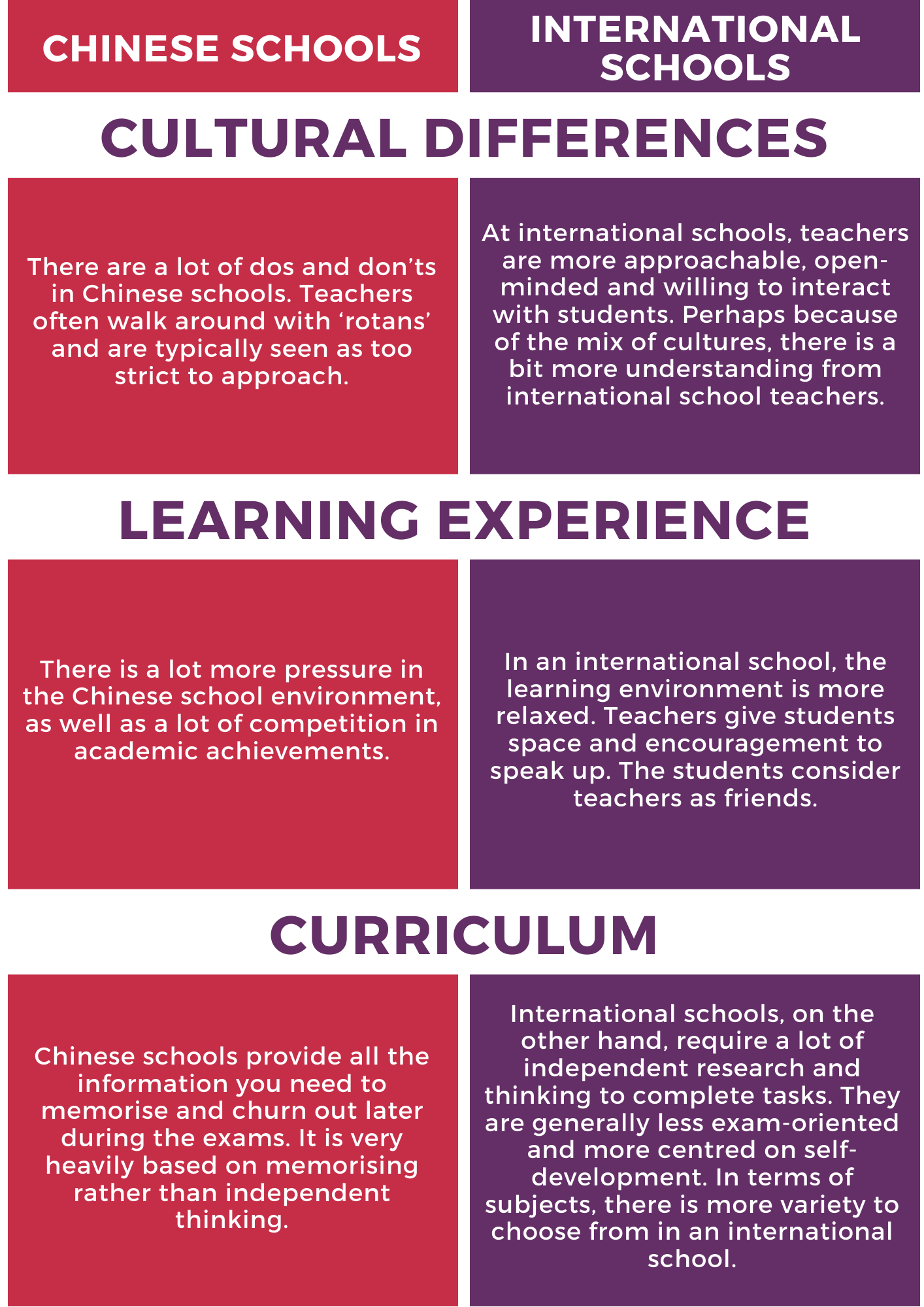What Kids Think about Switching from Chinese Schools to International Schools?
Published by SchoolAdvisor | Mar 31, 2021Today, children’s education is not only determined by the parents, but also by children’s own needs. Some of the thoughts that plague parents' minds like “Is this school right for my child?”; “Is he happy there?”; and “Can she be successful in this school?” are also questions that concern the child.

Government vernacular schools such as Chinese schools in Malaysia are popular options for parents who want their children to learn a language other than Bahasa Malaysia as the medium of instruction for subjects.
However, it is no secret that Chinese-medium schools have a reputation for being extremely strict. Most Asian parents have preconceived notions that these schools will be able to instil discipline in their children that regular schools won’t be able to. You have to ask yourself if that is the right strategy for your child.

As times have changed, the method of teaching has evolved too. Kids these days do not respond positively to strict ways of teaching. They are looking to learn in an environment that allows them to have the best of both academic and social worlds.
Before we explore deeper into the minds of the young ones on their thoughts about chinese schools and international schools, let’s first see the differences between Chinese schools and international schools:
Accreditation/Eligibility
International schools are often accredited by either local education authorities or foreign organisations. Their certifications are highly sought after and the students who possess them are believed to be the crème de la crème of the newer generation. International schools are only recognised as such if their parent campuses or the curricula they offer are from foreign countries.
Orientation/Focus

International schools are student-oriented, catering to students’ capability to have and maintain a keen interest in learning. Chinese schools are exam-oriented and focus on excellent academic achievements.
Both Chinese and international schools offer enrichment programmes for students to gain additional skills. However, Chinese schools advocate a more “by-the-book” approach while international schools encourage students to think outside the box.
Since Chinese schools are exam-oriented, teachers tend to assign a great deal of homework as it is believed to contribute to better learning. They take the phrase “practice makes perfect” to a whole other level compared to international schools, which go by whatever curriculum or specialisation they follow.
Some international schools specialise in grooming athletes or future leaders of STEAM (science, technology, engineering, the arts and mathematics), thus students are given relevant tasks to boost their potential.
Community

Chinese schools usually have a Chinese-majority student body. The communities have developed a habit of striving hard to overcome obstacles. Sure, these hardships are supposed to temper the students into becoming mentally stronger, but is it worth not being able to make friends and have a real childhood experience?
International schools, on the other hand, focus on a holistic approach. They empower students by acknowledging that each one has her own strengths and flaws. Rather than pressuring them to master more skills, international schools allow students to choose what they want to do through positive reinforcement.
Facilities
Accreditation from international organisations come with yearly or even monthly verifications to see whether international schools are worthy of maintaining their accredited statuses. One of these verification processes involves representatives from these organisations visiting the schools to check the facilities and teaching and learning processes.
Chinese schools’ facilities are influenced by three things: the funding they receive, their management board’s decisions, and students’ basic needs. The funding usually comes from the Chinese community and associations, student fees or investors, and is sometimes limited.
Thus, certain aspects of comfort such as niche facilities are sacrificed. The management board will decide on what to add or scrap, as long as the school is meeting (or ideally exceeding) the minimum standard comfortable learning environment for students.
Based on our research, these findings are mostly true although it is not the same case for every school.
Why switch?

In the past few years, there has been quite an increase of students shifting from Chinese schools to international schools. It is common for parents to switch schools after their child has completed primary education in a Chinese school and continue their child’s secondary education in an international school.
Some experts say this is a smart move, seeing as students get the best of both worlds. With the discipline that has been instilled throughout their education at Chinese primary schools, adolescent children can benefit from being exposed to the out-of-the-box thinking that is encouraged at international schools as they are a little older and have a better understanding of themselves.
Why just take our word for it? SchoolAdvisor decided to contact a few students who made the switch and, based on certain criteria, this is what they had to say:

However, one common thing all the former Chinese-school students mentioned was that they wouldn't trade their primary education at a Chinese school for anything because although it was tough due to the strictness and punishments, they became more organised and disciplined compared to their peers in an international school. The hardworking nature and diligence that was instilled in them helped them tremendously when it came to projects and passing major exams in an international school.
While you are here, check out also:
10 International Schools in Malaysia Offering Fee Waivers
International Schools in Malaysia that offer Scholarships
6 Things You Would Need to Know about International Schools
5 Things to Consider Before Sending Your Child to an International School
All You Need To Know About International Schools
Discipline in Chinese Schools: Caning and Strict Timetables?
Recent Articles
- How Studying at Three International Schools Shaped Isabelle Leung’s Path to Law
- A Home Away from Home Where Your Child Will Thrive
- Bridging Borders: Ng Gha Yuan’s Journey to the Ivy League
- Why More Malaysian Parents Are Choosing International Schools for Their Children
- Happiness vs. Academics: Are We Sacrificing Our Children’s Well-Being for Better Grades?








 Login with Google
Login with Google